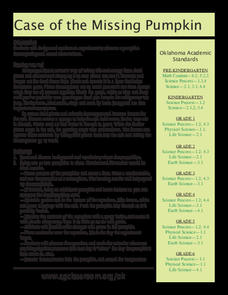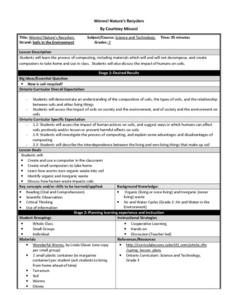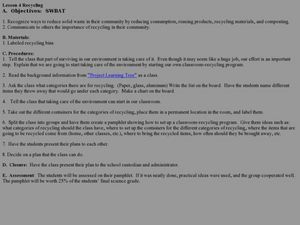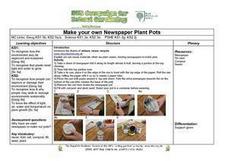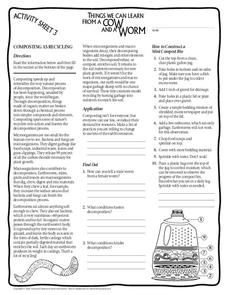Cornell University
Fibers, Dyes, and the Environment
Nanofibers can be made through electrospinning or force spinning in order to reduce the negative impact on the environment. Pupils study the role of fibers and dye on the environment through a series of five hands-on activities. Then,...
Curated OER
Case of the Missing Pumpkin
Scientists define and discuss decomposition, and watch pumpkins decompose and return to soil in classroom experiment. They record the date the experiment began, chart changes in pumpkins on a calendar, count how many days it takes...
California Academy of Science
Where Do I Put My Trash?
Where does the trash go after you put it in the garbage can? The class discusses sustainability, recycling, compost, and landfills as they play as fun relay game. In teams, they race to be the fastest group to successfully sort their...
Curated OER
Worms, Nature's Recyclers!
Students study what worms need to survive in different environments. They study how worm composting improves soil and reduce waste. They discuss composting techniques and present a puppet show about a worm's life.
Curated OER
Recycling/Solid Waste Education with Shel Silverstein: "Sarah Cynthia Sylvia Stout"
Both poetry analysis and waste disposal are more engaging topics for young readers with a activity to accompany the Shel Silverstein poem 'Sarah Cynthia Sylvia Stout Would Not Take the Garbage Out" from Where the Sidewalk Ends. Not only...
Curated OER
What a Waste
Students analyze components of garbage. They collect and sort a few days' worth of garbage. They chart the results of an investigation.
Curated OER
Researching the Nutrient Cycle
In this researching the nutrient cycle worksheet, students read about the cycle of nutrients, look at the diagram, then answer two questions by doing research on this topic.
Curated OER
Making Your Own Sampling Tools
Learners examine cause-and-effect relationship between human attitudes and behavior in the environment. They also assist citizens in increasing their sensitivity and stewardship for the environment.
Curated OER
Let's make a landfill
Students create a mini-landfill. In this decomposing instructional activity, students differentiate between materials that decay from those that won't. Students identify the factors that might help materials from decomposing. Students...
Curated OER
Where is Away?
Focusing on where are garbage goes once we dispose of it, learners explore environmental concerns. Using a clear format, this lesson leads learners through a discussion of waste reduction, recycling, and composting. Then, they discuss...
Curated OER
How to Grow a Sunflower Plant
Pupils explore botany by conducting a sunflower growth experiment. In this plant life lesson, students identify the anatomy of a sunflower plant and the essential nutrients it requires to grow. Pupils utilize compost, soil, garden spades...
Cal Recycle
Conserving Natural Resources
Trying to plan an engaging elementary science unit on natural resources? Conserve your energy! This five-part series of lessons and hands-on activities has exactly what you need to teach young scholars about the importance of conservation.
Core Knowledge Foundation
Taking Care of the Earth Tell It Again!™ Read-Aloud Anthology
A read-aloud anthology closely examines human impact on the Earth while boosting reading comprehension skills. Through stories, scholars examine the concepts of natural resources, pollution, garbage, and recycling and brainstorm ways to...
Curated OER
Helping the Soil
In this soil conservation activity, students study and analyze two excellent ways to enhance soil conservation: compost heap and leaf-mould. Students review all the ingredients in making both.
Curated OER
Causal Patterns in Ecosystems Section 3
Students design and create a worm and worm free compost tanks for observation of decay in ecosystems. They make predictions, care, and revist tanks using their journals for observation and data collection.
Curated OER
How Long Until Dirt
Third graders examine the difference between composting and wasting food. They problem-solve what to do about leftovers after lunches so good food doesn't go to waste.They study food storage techniques that are environmentally friendly...
Curated OER
A Shredding We Will Go
Young scholars take charge of a recycling project . In this environmental issues lesson, students manage a paper recycling project and use compost made from the recycled paper to beautify trees.
Curated OER
Worms: Nature's Recyclers
Students explore vermi-composting. For this vermi-composting lesson, students listen to the story Diary of a Worm and discuss the parts of a worm. They create worm bins and add organic food for the worms to recycle.
Curated OER
Can Worms See?
Second graders discuss the previously created worm compost and the importance of living creatures to the Environment. In this worm lesson, 2nd graders observe worms and record their sensitivity to light. Students design a petri dish...
Curated OER
Organic and Inorganic Recycling
Students examine their role in polluting the environment and discuss the importance of recycling. In groups, they place earthworms into compost piles to observe why they are considered natural recyclers. They also practice sorting a...
Curated OER
Recycling: lesson 4
Students create plans in order to reduce solid waste. In this recycling lesson plan, students discuss and come up with plans to reduce consumption, reusing products, recycling materials, and composting and then present their plans to the...
Curated OER
Make Your Own Newspaper Plant Pots
Students make plant pots out of newspaper as part of a recycle, reuse, and reduce lesson. In this recycling lesson, students fold a piece of newspaper to make a pot in which to start plants. They fill it with compost and plant seeds.
Curated OER
Willie the Worm
Students explore Earth science by participating in a compost activity in class. In this worm lesson, students discuss the importance of worms in the creation of plants. Students cut out pieces from a print out to assemble a paper worm in...
Curated OER
Composting As Recycling
In this environment worksheet, students use a milk jug and worms to demonstrate how garbage can be biodegradable in the right conditions.
Other popular searches
- Worm Composting
- Composting Third Grade
- Trash & Recycling Composting
- Importance of Composting
- 2 Liter Bottle Composting
- Composting Temperature
- Science of Composting
- Classroom Composting
- Worms and Composting
- Lesson Plans on Composting
- Composting Tag
- Composting Box



